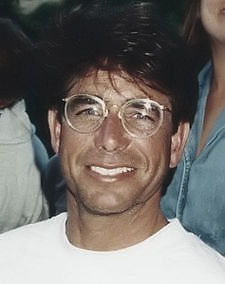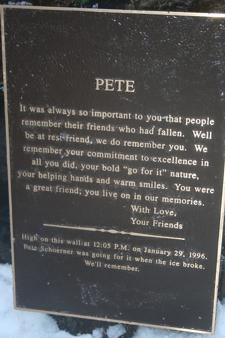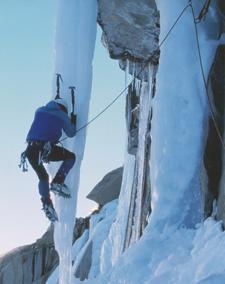
Pete Schoerner - Dean Rosnau Photo
Pete Schoerner, a resident of June Lake for 17 years, was a paramedic for Mono County, a member of June Mountain Ski Patrol, a volunteer for the Mono County Sheriff's Search and Rescue Team, and had gone out on June Lake fire calls. This web site is dedicated to Pete.
Peter C. Schoerner, 40, born Sept. 1, 1955, in Glendale, CA, passed away January 29, 1996 due to an accident while ice climbing near June Lake.
Along with his fellow Search and Rescue member Doug Nidever, he was attempting the first ascent of a rarely formed, five pitch ice smear on Carson Peak. Schoerner was leading the crux fourth pitch climbing the column about 35 feet higher and to the side of Nidever and when he anchored in, the area he was anchored into gave way and came down with him attached to it. He fell about 140 feet and was killed instantly on impact. Nidever was not injured.
"It was a freak accident, whether the warm temperatures dislodged the ice or weakened the ice away from the mountain we'll never know," said Mono County Sheriff Dan Paranick. "He was a good guy, dedicated to what he liked to do. We're surely going to miss him."
The recovery was accomplished by seven of Pete's friends who had the skills to do the task. Climbers were John Ellsworth, Doug Nidever, and Dean Rosnau. The ground support team was Sharon Baker, Jim Endo, and Ed and Jane Escoto.
The following tribute to Pete was written by Jon Buccowich on behalf of himself and the Paramedic Association.
A Tribute to Pete Schoerner

Dean Rosnau Photo
We lost Pete Schoerner yesterday. His life touched our souls, as did his death. This tribute is written on behalf of the Paramedic Association and my long-standing personal relationship with him. We were friends, neighbors, co-workers, partners, playmates, and confidants. We were family.
Pete was sensitive and compassionate. His priorities revolved around Cynthia, Poplar, Laurel and Torrey; his immense circle of friends; and his passion for excitement. Undisputedly, Pete was extreme. Rescuer, athlete and mountaineer, his essence was pure and focused.
Fifteen years ago, he and I ran the first ambulance call of his career. It was the beginning of many events in his life that I had the honor to witness. He touched countless lives, and saved more than his share. I have never known anyone to experience more personal anguish in the course of his duty, only to emerge with unequaled strength and fortitude. In his trade, he spent countless hours pouring and finishing cement. He was truly our working class hero.
He did the first descent of the Kamikaze course. His ability on a bicycle was the envy of many. He ski raced and certified for ski patrol, while on three pins. He coached the kid's soccer team. Whitewater kayaking, Surfing, Motorcycling, Rock climbing, Ski mountaineering, Ice-climbing. It finally caught up with him. Pete checked out with the gusto and enthusiasm that defined his life, attempting the first ascent of a climb he created, both literally and figuratively.
We already miss him with the depth of our being. Anyone who knew him will never forget him. When I think of Pete, the word that jumps into my mind is "first". He was always the first with a smile and the first with kindness. He is, and always will be, first class. Goodbye, our friend.
The following tribute to Pete was written by his friend Fred Weatherly and appeared in the February 1, and February 8, 1996 issues of the Mammoth Times Newspaper.
Pete Schoerner - He Died Trying

Pete Schoerner ice climbing on The Fang
Andy Selters Photo
Our community was stunned this week by the death of Pete Schoerner, who died in an ice-climbing accident.
Pete had a lot of friends and was becoming a good friend to me. We spoke of things of the soul, dreams, fears, disappointments, challenges and limits. From that window I now remember and write of Pete.
Pete was a paramedic and active on the Search and Rescue Team. These were very impactful experiences. He was a very sensitive and caring man who, like all good soldiers, waited till after the war to do his grieving.
We also spoke of faith and limits, and how you can't save everybody unless you think it's appropriate to aspire to do God's job.
Pete aspired to great heights. To call Pete a mountain man is an understatement. One day he led a training for the Search and Rescue Team, a tele-backcountry ski clinic. Now, most ski instructors tell you when going downhill and desiring to turn right, you transfer the weight to the downhill left ski and put pressure on the inside edge of the left downhill ski. This was far too simple and non challenging for Pete even on skinny skis so, to our amazement, he would turn right by putting his weight on the outside edge of the uphill ski and glide the downhill ski through the air like a wand. He was magical, he was beautiful. His skills on skis or in a kayak or slinging an ice ax were majestic. He aspired to great heights. Something about the mountains kept saying "Pete, come up here."
So one day, while others in the climbing community only longed to climb a certain ice flow, Pete began to climb it. Pete was the kind of guy who embraced challenges and kept trying. These rare qualities endeared him to his friends and made him special.
The mountains are not the only slippery places in our lives. The human condition has a zillion opportunities to slip, fall short, err in judgment, pick the wrong path, miss the mark and not measure up to our goals. Only those who never try are free from falling.
In life, like on that ice flow, things we think are solid sometimes come crashing down around us. In climbing or skiing, slips and falls are expected. They are anticipated as the norm, and protection is placed strategically for such highly predictable mishaps. In living, slips and falls are also the norm, even though we aspire differently. That is where those limits and the strategic role of grace comes in. Our job is to keep trying, to keep aspiring. May we all die trying.
God, too, has a role in this divine drama of the soul. His is to anticipate our fall, keep picking us up, dusting us off and helping us to rise up. It doesn't surprise him one bit when we fall, which he predicted, nor does it keep him from calling us on to greater heights while granting grace.
Sometimes, we find ourselves in the predicament novice climbers find themselves in -- with 5.8 ability on a 6.10 route. When this happens, we do the most natural thing, we fall. Lesser men no longer aspire to climb after such a fall. Pete was no "lesser man" and, like him, I hope I am found still trying when I die. Not only facing the challenges of the mountains but doing the work of the soul, which is my biggest challenge, like learning to love, being there for my wife and son, and contributing to my community. May we all "die trying," which is both the least and the most we can do.
Where we fall short, God's grace can make up the difference in our efforts and in our lives. Where our limits are most obvious, his abilities are most welcome. Over and over again, we need someone to pick us up, put our brokenness back together, place us on belay and rekindle our spirits enroute to higher things.
The mountains are not the only things that call "come up here." In fact, it is just a carefully disguised wind song of the spirit. In Revelation, John, too, heard the voice.
"After this I looked, and there before me was a door standing open in heaven. And the voice I first heard speaking to me like a trumpet said, 'Come up here' and I will show you what must take place after this." Revelation 4:1.
Pete, you will be missed. We will remember how you faced challenges with courage and a free spirit. Pete, you have heard the call "come up here." It is time to ascend -- on belay, rise up.